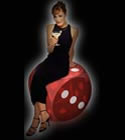Reading Hands
Excellent techniques are available for reading hands in seven card stud high-low-split eight-or-better.
Most commonly, you analyze the meaning of an opponent’s check, bet, or raise, and you look at the exposed cards and try to judge from the what his entire hand might be.
You then combine the plays he has made throughout the hand with the exposed cards and come to a determination about his most likely hand.
In other words, you use logic to read hands.
You interpret your opponents’ plays on each round and note the scare cards that appear on the board, paying close attention to the order in which they appear.
You then put these two pieces of evidence together – the plays and the cards on the board – to draw a conclusion about an opponent’s most likely hand.
Sometimes you can put an opponent on a specific hand quite early. However, in general, it’s a mistake to do this and then stick to your initial conclusion no matter how things develop.
A player who raises on third street and then raises again after catching only small cards may have a big pair in the hole, but he also may be on a draw and is trying for a free card.
Drawing narrow, irreversible conclusion early can lead to costly mistakes later, such as giving that free card or betting into your opponent when he makes his hand.
What you should do is to put an opponent on a variety of hands at the start of play, and as play progresses, eliminate some of those hands based on his later play and on the cards he catches.
Through this process of elimination, you should have a good idea of what that opponent has ( or is drawing to ) when the last card is dealt.
For instance, suppose on third street that you raise with a high card up and an opponent showing a small card calls your raise.
On fourth street, he catches another small card close in rank to his upcard and bets after you check. You call, and on fifth street you both catch blanks.
When you check to him, he also checks. It is now likely that this player has only a three-card low with a small pair.
If your opponent catches another low card on sixth street that appears to possibly give him a small straight, you should not fold.
If he catches a blank on sixth street.
In addition, if he catches good on sixth street, you should check and call on the river, since you still have a good shot at the high half of the pot. ( In fact, if he misses again and fails to make a low, you might scoop the whole pot.)
However, if it turns out that you cannot beat a small pair ( perhaps you started with a high three flush), you may now want to bet, since there is some chance that you can pick up the pot.


